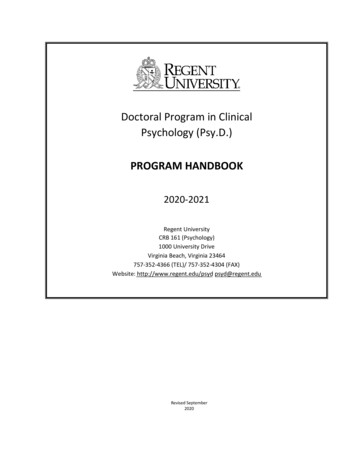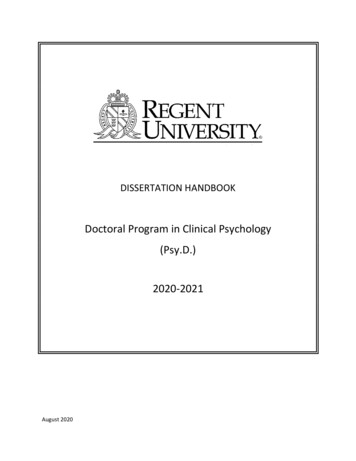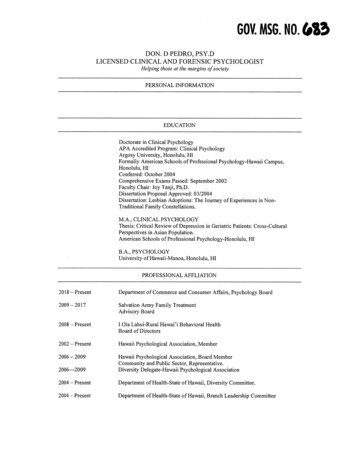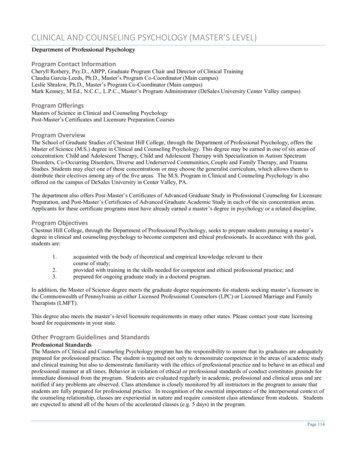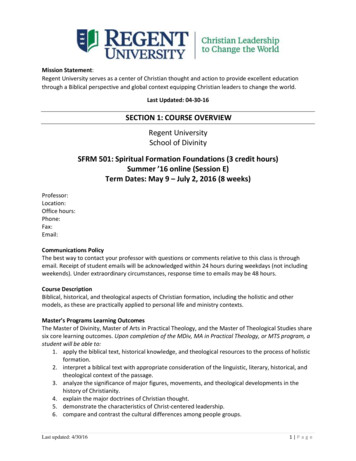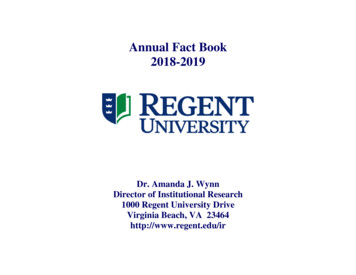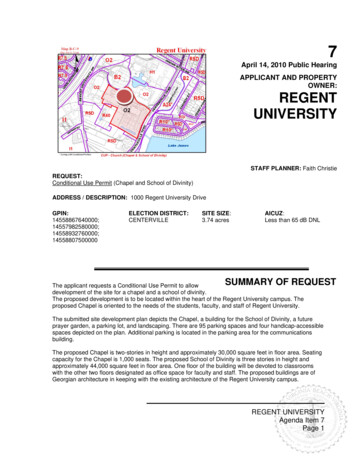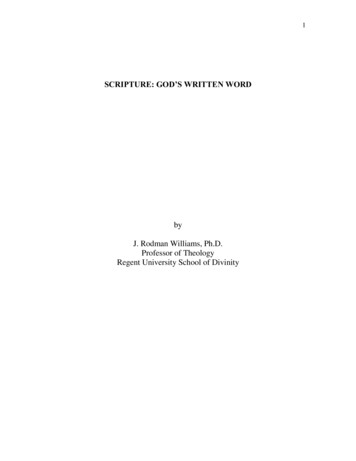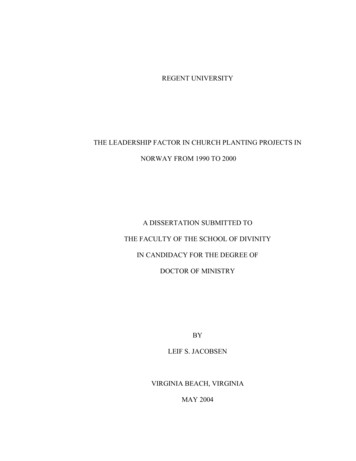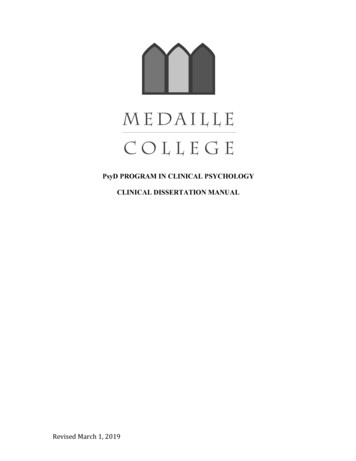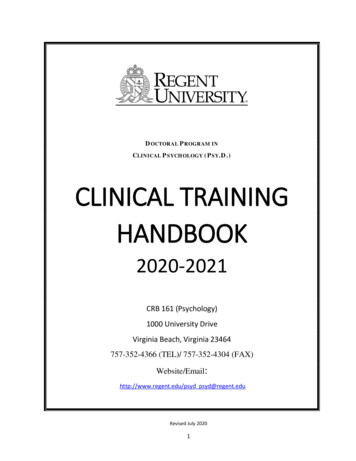
Transcription
DOCTORAL PROGRAM INCLINICAL PSYCHOLOGY (PSY.D.)CLINICAL TRAININGHANDBOOK2020-2021CRB 161 (Psychology)1000 University DriveVirginia Beach, Virginia 23464757-352-4366 (TEL)/ 757-352-4304 (FAX)Website/Email:37TUhttp://www.regent.edu/psyd psyd@regent.eduRevised July 20201
IMPORTANT NOTE: Handbooks are updated each year. Students must adhere to thecurrent academic year’s handbook for all program requirements with the exception ofrequirements for programs progression outlined in the University Catalog.Significant updates in this revision of the handbook:--Language on the APE form regarding supervision has changed, as hours obtainedfrom APE experiences outside of formal practica typically do not count towardslicensure hours.Instructions for practica and internship registration have been included.Modifications have been made to the Personality Assessment and ClinicalInterviewing Probe Rubrics.Modifications have been made to the list of Time2Track activities to improve clarityand provide updates in regards to telehealth practice.Revised July 20202
TABLE OF CONTENTS37TRegent Clinical Training Philosophy Introduction . 637T37T37T37TDefinitions . 737TClinical Competence . 837TSequential Clinical Training Objectives . 1237T37T37TFirst Year – Pre-Practicum . 1337TSecond & Third Year – Intensive Practicum Sequence . 1437TFourth Year – Advanced Practicum Sequence – (PSY 739 & 741; Transition to Leadership Rolesin Clinical Practice): . 1537T37T37TClinical Probes . 1637T37T37T37T37T37T37T37TNon-Course Based Summative Probes: . 1837TProgram Outcome Mileposts & Roadblocks for Specific Competencies . 2037TIntensive Practicum Sequence (psy 733-738) . 3537T37T37T37T37TCourse BAsed Summative Probes: . 1837T37T37T37TPre-Practicum . 3537T37TPsychological Services Center Based Probes: . 1737T37T37T37TAcquiring & Showing Competense: Mileposts & Roadblocks . 1937T37TCourse Based Formative Probes: . 16Clinical Practica Intensive Sequence Overview . 3537TPractica Grading . 3637TPractica Clinical Activities . 3637TIntensive Practica Sequence Requirements . 3737TPractica Selection . 4237TThe Practica Contract . 4437TAdvanced Clinical Training Sequence . 4537TFifth Year Pre-Internship Training . 4637TExternal Employment in Clinical Positions . 4737TPre-Doctoral Internship . 4937T37T37T37T37T37TRequesting Approval to Pursue an Internship: . 4937TApplying to an Internship Site: . 5037TThe APPIC Matching Process: . 5137TDPCP Requirements: . 5237TThe Internship Contract: . 5537TRevised July 20203
37T37T37T37T37T37T37T37T37TFailing Internship: . 5537TInternational Student Issues: . 5537TProfessional Practice Insurance: . 5637T37T37T37T37TRights and Responsibilities . 5637T37TIntern Evaluation Forms: . 55Doctoral Students . 5637TFaculty Practica Instructor . 5737TSite Supervisor . 5837TChecklist of Student Practica Requirements . 5937TClinical Training Progression Tracking Sheet . 6137TLiability Insurance . 6237TDisability Accomodations Policy . 6237TAppendices for Clinical Training Handbook . 6637T37TAppendix A: Probe Scoring Rubrics . nical Interviewing Probe: Video recording evaluation . 6837TPsychopathology Probe . 7637TIntelligence Testing Probe . 7837TPersonality Assessment Probe . 8937TTreatment Planning Probe . 9137TCase Presentation Probe . 9437TPsychotherapeutics Probe . 9837TDiversity Probe . 10137TIntegration Probe . 10937TIntegrated Assessment Probe . 11237TAdvanced Case Presentation Probe . 11837TAdvanced Assessment Report Writing Probe . 12137TInternship Readiness Portfolio Probe . 12437TAppendix B: INITIAL PRACTICA FORMS . 13437T37T37T37T37T37TPRE-PRACTICUM ACTIVITIES . 13537TPsy.D. PRACTICUM SITE REQUEST FORM . 13637TEXAMPLE PRACTICA SITE LIST . 13837TDOCTORAL PRACTICA CONTRACT . 14137TSTUDENT ETHICAL AGREEMENT . 14337TRevised July 20204
37T37T37T37T37TPRACTICA STUDENT EVALUATION ADMINISTERED VIA TIME2TRACK: . 14737TTime2Track Activities List . 15237TGuidelines for Submitting Pre-Practica Activities in Time2Track . 15537TAppendix D: Student Forms . 15937T37T37TADVANCED PROFESSIONAL EXPERIENCE CONTRACT . 16337TPsy.D. Student External Work Approval Form . 16537TAppendix E: Internship Forms . 16737T37T37T37T37T37TPart-Time Practicum Placement Request . 14537T37T37T37TAppendix C: Time2Track Information . 14637T37TWAIVER OF LIABILITY . 144Request for Clearance to Apply for Pre-Doctoral Internship . 16837TPsy.D. Program Criteria for Designed Internship . 17037TStudent Internship Training Evaluation Form . 17537TSample APPIC Application . 17737TAppendix F: Clinical Progression Remediation Form . 18537T37TClinical Progression Remediation Plan . 18637TRevised July 20205
REGENT CLINICAL TRAINING PHILOSOPHY INTRODUCTIONThis handbook gives an overview of the clinical skills, practica requirements, procedures, andopportunities available to students in the Doctoral Program in Clinical Psychology (DPCP) atRegent University. This document is adjunct to other Regent University DPCP materials. Allstudents are responsible for reading and becoming familiar with the clinical skill and fieldexperience requirements of the doctoral program. This document is subject to ongoing reviewand revisions and students will receive updates as issued.The DPCP is designed to provide students with a coordinated, progressive and logical sequenceof clinical training facilitating their development as emerging professionals. The trainingprogression is aimed at fostering specific clinical competencies. A number of thesecompetencies are achieved in the context of formal coursework. Many others are developedthrough carefully supervised clinical experiences. The clinical training sequence is a plannedcourse of study incorporating didactic and supervised experiential training. The first two yearsof training occur on campus. During the third and fourth year, the student is typically placedin an off-campus training environment. The pre-doctoral practica sequence affords varied,progressive training opportunities in multiple settings. Practica training is facilitated byintensive supervision provided at training sites combined with secondary “practica” seminarsinstructed by Regent faculty. While site supervisors retain primary responsibility for thestudent’s supervision, the practica seminars extend this training with consultative supervisionand facilitate extensive exploration of integration issues.Because of the practitioner-scholar model adopted by the doctoral program, a substantialamount of students’ time will be spent applying/ refining psychological knowledge and skillsin clinical contexts. The DPCP is designed to produce competent practitioners of clinicalpsychology who are poised to continually enhance their practice with ongoing developmentsin the field. Although the DPCP does not attempt to produce professionals who functionprimarily as researcher-scientists, our students are equipped to function as ‘local clinicalscientists’ who are capable of providing training, supervision and leadership in their practicecontexts. This training model has a number of implications for the clinical competenciesstudents must develop. These are discussed in detail in section two.A key distinctive of the DPCP at Regent University is the fact that all instruction occurs withinthe broad outlines of a Christian worldview. While Regent is not affiliated with any specificdenomination or sect, it is committed to an evangelical Christian worldview. This broadcommitment affords a great deal of variety in both faculty and student approaches toacademic development. Our faculty and staff represent a wide range of Christiandenominations. The DPCP’s Christian commitment brings with it additional implications forclinical training. First, the religious context is viewed as a ‘value-added’ component of clinicalRevised July 20206
training. Students do not receive a weakened or compromised professional training becauseof the religious component of the program. Rather a key element of the Christian worldviewis the view of vocation as avocation. Since our careers are viewed as service contexts or‘callings’ emerging from our more general spiritual commitments, an emphasis on ‘excellence’ensues. Second, students are expected to become proficient in working with issues of religiousdiversity. Ethical and respectful approaches to working with client religious diversity areincorporated throughout the program. Finally, students are required to develop skills in theintegration of psychology and Christianity. Although the DPCP does not mandate a specificapproach to integration, students are expected to integrate Christian perspectives, practicesor techniques in a professionally competent manner.DEFINITIONS The pre-internship practica experience is a minimum of 1600 hours duration. Thepractica training starts during the first year of the program with the pre-practicum sequence.Students begin by accumulating closely mentored supervised experience in clinical lab courses(interviewing, the basic assessment courses) and through observation activities. Students willtypically accumulate a minimum of 100 hours of initial clinical experience during the first year.The intensive clinical practica sequence starts in the second year and runs continuously for sixsemesters (Fall, Spring, Summer). A total of 600 hours of supervised clinical experience peryear must be acquired during the second and third year of the program. Students mustmaintain satisfactory progress in the accompanying seminar (Psy 733-738) each practicasemester. During the fourth year, students complete the advanced practicum sequence.During the fall, they complete a clinical lab in conjunction with the Supervision andConsultation course (Psy 763). Students will accrue approximately 8 hours of experience insupervising beginning practica students, another 3 hours in a consultation project, as well asan advanced practica placement consisting of a minimum of 8 hours weekly. The preinternship practica culminates in an Advanced Practica seminar during the fourth year (Psy739 & 741). The consultation project is completed in PSY 741. A Faculty Practica Instructor provides consultation and oversight at the University level asthe instructor for Clinical Practica class. Ordinarily, the faculty supervisor is not privy toidentifying information about clients seen by students at their practica sites. Consequently,the site supervisor retains primary responsibility for student supervision. The practicainstructor monitors student skill development throughout the practica year and conveysinformation about this to the Director of Clinical Training. The Site Supervisor provides over-all supervision at the practica site and may delegateother site personnel to work with the student. The site supervisor will typically be a licensedclinical psychologist. However, there may be situations when supervision by another mentalhealth professional is necessary for a portion of the students training. Such arrangements areacceptable providing the following conditions are met:1) The student does not perform services that are outside of the mental health professionals’regulated scope of practice (e.g., performing psychological testing under the supervision of apsychiatrist).Revised July 20207
2) The student is obtaining supervised clinical experience in an area contained within the scopeof practice for health service psychology.3) The supervisor must be a licensed mental health professional, or under the supervision ofsuch a supervisor.4) The supervised training from a non-psychologist should be a small portion of the studentsoverall training.The Director of Clinical Training (DCT) has responsibility and authority for thecontinued development, implementation, and oversight of the clinical training sequence inthe DPCP as delegated by the Psy.D. Program Director. The DCT maintains information aboutstudent clinical skill development, reflected through practica evaluations, clinical probes, andclinical remediations when needed. The DCT is a liaison with practica and internship agencies,consulting with agencies to develop training programs for students. Other duties includeapproving students’ practica and internship arrangements, serving as a consultant to studentsand faculty on practica and internship matters, maintaining practica and internshipinformation resources, developing and disseminating all policies and procedures that apply topractica and internships, and interpreting/applying those policies to specific cases. The DCT isassisted by the Practica Coordinator (Dr. Jones) in the development and maintenance ofpractica training contracts.CLINICAL COMPETENCEOver the course of the DPCP, the student’s status gradually shifts from that of a student tothat of an emerging professional.
Regent University. This document is adjunct to other Regent University DPCP materials. All students are responsible for reading and becoming familiar with the clinical skill and field experience requirements of the doctoral program. This document is subject to ongoing review and revisions and students will receive updates as issued.
